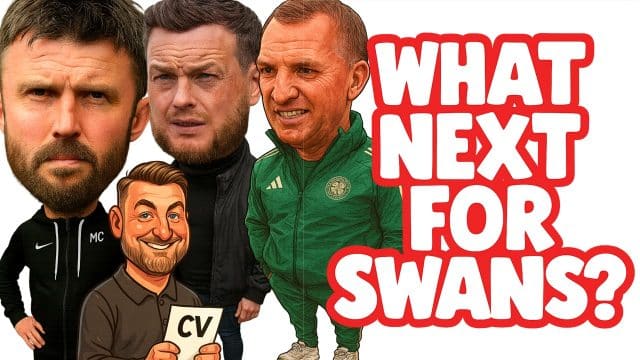Swansea City yesterday pulled the trigger on Alan Sheehan’s tenure, ending another managerial reign that barely lasted twelve months.
It’s a fair indictment of modern football that this came just fifteen games into the season. But Saturday’s 4–1 defeat to Ipswich at the Swansea.com Stadium was the final straw in a campaign that’s been underwhelming at best and increasingly worrying for anyone with long-term ambitions for the club.
The reality is, it wasn’t just the result against Ipswich. This was a culmination of poor performances, tactical confusion, and a growing sense that the dressing room had lost its spark. Saturday was simply the most abject display of the season, and it sealed a decision that had been brewing for weeks.
Sacking Sheehan was the right call. It reflects the club’s ambition both on and off the pitch, and acknowledges the need for a return on investment after a summer of relatively high spending.
🔗 Swansea City Fans Lose Faith as Alan Sheehan Faces Growing Pressure Over Poor Form
Were the Swans Right to Appoint Sheehan?
 Alan Sheehan was asked to take control on a caretaker basis following the departure of Luke Williams in February.
Alan Sheehan was asked to take control on a caretaker basis following the departure of Luke Williams in February.
It came off the back of a relatively successful spell after Michael Duff’s exit and Williams’ arrival, but the threat of relegation was still very real.
Sheehan didn’t just take the reins. He used them to steer the Swans away from danger and into a comfortable mid-table finish. It left many wondering what might have been had the club acted sooner on Williams. There’s probably a clue there to the events of yesterday.
A run of five straight wins lit up the end of the season. The drab, lifeless football served up under Williams was replaced by something that looked and felt different. There was a pattern. There was purpose. Fans backed it. Performances improved. And that momentum led the club to make Sheehan’s appointment permanent in April.
History will now record that as the wrong decision. But at the time, the club had little choice. Not because there were no alternatives, but because Sheehan had delivered the change that was needed. The fans were largely behind him. The results and performances made the case for him.
With a three-year contract safely in his pocket, Sheehan took us into the summer with optimism high. By our standards, anyway. And for a while, that optimism only grew.
A Summer That Raised Hopes
When the season ticked into its closed version in May, few Swans fans were prepared for what happened next.
For years, we’ve been used to transfer windows that felt panicked and reactive, especially as deadlines loomed. But this time, it felt like there might just have been a plan.
Early moves were made. Players arrived regularly. And the optimism Sheehan had sparked in those final three months of the season was only strengthened by the pace and purpose of the club’s transfer business.
Realism was still needed. Talk of a top six squad was always premature, especially given most of the new arrivals hadn’t been seen live by supporters. But after the disaster that had been Kaplan, Levien and Coleman, this at least felt like progression.
The warning signs were there, though. A dismal set of pre-season results should probably have set more hares running than they did. But a win over Sheffield United in our first home game, followed by a few more August signings, kept confidence high despite the obvious red flags.
🔗 Swansea City’s Summer Transfer Window: Quiet Ambition or Scattergun Pragmatism?
Same Old Patterns, Same Old Problems
The dismal form of pre-season continued into the regular season, and as the pressure grew, the defensiveness got worse.
Games followed a win, loss, draw pattern every three matches, which always dictates a mid-table position. In the early stages of the Championship, the play-offs can feel within reach, but to actually get there, wins need to come more frequently than one in three.
But it wasn’t just the results. It was the performances. Make no mistake, the volume of empty seats at the Swansea.com Stadium every week will not have gone unnoticed. After a brief period of optimism, apathy was setting in again. The same apathy that had plagued previous managers and owners.
previous managers and owners.
With the excitement of the summer, where investments from Luka Modric and Snoop Dogg felt like a different level, there was a growing worry that the next level might be the wrong direction on the pitch.
Goals weren’t there. The style of play wasn’t there. The desire to win looked absent. And more importantly, the fans weren’t returning.
All of this was laid bare in the 4–1 home defeat to Ipswich. It sealed Sheehan’s fate. But make no mistake, this wasn’t about one bad performance. It was the culmination of everything we’d seen since the summer. And it was never a case of not wanting him to succeed. It was the growing realisation that he was never going to reach that level.
The 24-Hour Turnaround: What Changed?
The feelings of the fans were clear after Ipswich: Sheehan had to go. A site article here two weeks ago was met with derision in many quarters when it suggested that change was coming, but it proved to be correct. The warning signs were there.
On Monday, it was no coincidence that both Wales Online and BBC Sport reported that a change was unlikely. It seemed, at that point, as if the board was backing their man. Had he been sacked on Monday, the surprise probably wouldn’t have been large. But when it came on Tuesday, it felt more unexpected.
The narrative placed on Monday had flipped almost completely in 24 hours. The decision to part company was the right one. But why release one version of events on Monday and then change it the next day? It’s a departure that leaves unanswered questions.
The news also broke from Stu James at The Athletic a good hour before the club statement, which maybe suggests the questions in our next section are further advanced than we currently know. Or at least some of them.
Whatever the reasons, it shows a desire from the owners not to settle for second best. And while nobody can be heavily criticised for the appointment, making a change before we slip too far into something we struggle to get out of is the right call.
🔗 The Difficult Questions Facing Alan Sheehan This Morning
What Comes After Sheehan?
There are many decisions to be made in the coming days. Not just who takes charge of first team operations, which was a notable absence from yesterday’s club statement. The international window means numbers around Fairwood are limited, but someone needs to take control.
Or does the apparent turnaround in 24 hours suggest that a plan for a replacement is already in motion? Something changed between Monday and Tuesday, and I’m not convinced we’ve seen the full picture yet. I believe the decision to relieve Sheehan of his duties was sealed soon after the Ipswich game, possibly even before. But there’s a reason why the stories of Monday and Tuesday don’t match, and we haven’t seen it yet.
 Sheehan’s departure also exposes the lack of clear leadership in football operations. Who leads a managerial hunt? Tom Gorringe is involved, no doubt. But who else? Who has the experience? Surely we’re not adding Adam Worth to this. It’s questionable enough that one of Swansea’s original forum trolls is leading recruitment. Extending that into a manager hunt would be a stretch. So maybe the real search is for a director of football. Someone to lead and oversee football operations. Add in a trusted coaching team and it could work. You’d need someone experienced at multiple levels of the game, and likely someone already available. There would be options.
Sheehan’s departure also exposes the lack of clear leadership in football operations. Who leads a managerial hunt? Tom Gorringe is involved, no doubt. But who else? Who has the experience? Surely we’re not adding Adam Worth to this. It’s questionable enough that one of Swansea’s original forum trolls is leading recruitment. Extending that into a manager hunt would be a stretch. So maybe the real search is for a director of football. Someone to lead and oversee football operations. Add in a trusted coaching team and it could work. You’d need someone experienced at multiple levels of the game, and likely someone already available. There would be options.
Yesterday also brought news that Celtic’s head of football scouting operations, Jay Lefevre, is heading to Swansea. That raises questions. Is he working alongside Worth? That seems most likely. But is it also an admission that promoting someone with no experience into a leading role is an experiment that isn’t fully working? Regardless of Lefevre’s credentials, this is an additional appointment and a recognition that somewhere in our leadership team, there’s a hole that needs filling.
Questions should continue to be asked about the summer recruitment. Plenty have said a better manager would get a better tune out of this squad, and we agree. But once the new manager is in place, we’ll see whether that statement holds true. Alan Sheehan may have paid the price for performances, but his departure doesn’t give a free pass to our spreadsheet approach to recruitment. Far from it.
I won’t speculate on names. I firmly believe we’re going to move swiftly, and there’s little doubt in my mind that discussions have already taken place. That suggests we’re targeting someone out of work rather than in it, but that’s a statement, not a guarantee.
What we do know is this: the next decision is a big one. After Duff, Williams and now Sheehan, we’ve built a trend of quick managerial turnover. That has to change. We’re crying out for stability. Everything we know tells us that constant change only leads one way. And the gap to League One is bigger than we like to admit. Just ask those who’ve been there.
The eyes today are on those in charge at Swansea City. Can they prove they can deliver? Time will tell.

This article first appeared on JACKARMY.net.

